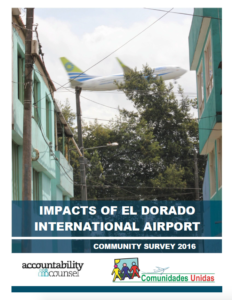Colombia: Airport Expansion
-
Overview
Accountability Counsel assists communities in Fontibón, Colombia to address the extreme health problems they experience as a result of an expansion of El Dorado International Airport. New investment from the Inter-American Development Bank (IDB) means that jets roar just feet above their homes, setting off alarms and shaking homes 24 hours a day.
Comunidades Unidas, a group of advocates from Fontibón, filed a complaint to the IDB accountability office, the Independent Consultation and Investigation Mechanism (MICI), in August 2011. While the complaint raised several important concerns about the airport expansion, one of the principal concerns was the lack of noise mitigation. There is no reprieve from the noise. As a result, at least one third of adult residents of Fontibón suffer from chronic insomnia, leading to symptoms such as frequent headaches, irritability, anxiety, and difficulty concentrating. The noise has also caused hearing damage in children, impacting their development and academic progress.
Accountability Counsel supported the community in the complaint process with MICI, which led to a compliance investigation confirming violations of IDB policy. We are now continuing to partner with Comunidades Unidas and the community of Fontibón as we pursue additional accountability strategies focused on ensuring that the rights of local families are respected and protected.
Read more about our policy work related to the IDB here.
“There was a time in which we lived in complete harmony with the airport, when the second runway didn’t exist, when we could enjoy a healthy environment, peaceful sleep, and communicate with our families and neighbors in a normal way without noise pollution.” — Julio Ramón Acosta Téllez, resident of Fontibón
-
The Story
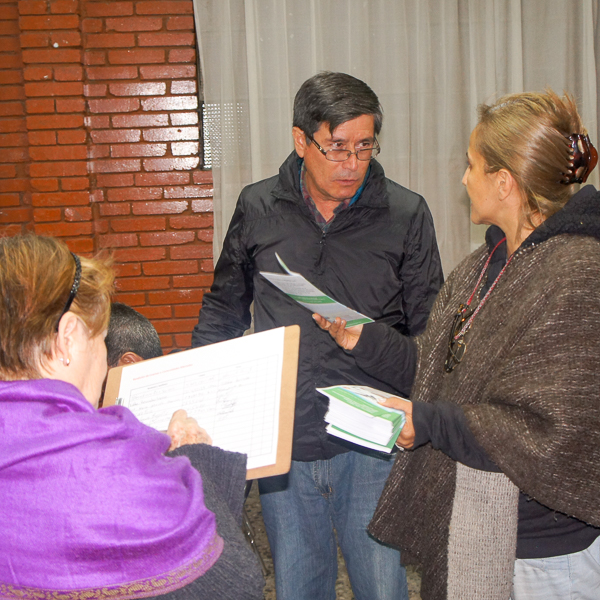
Gloria Molina, spokesperson for Comunidades Unidas, shares information about the MICI report.
Imagine an airport operating so close to your home that you suffer hearing loss, your home shakes, and your children experience developmental disabilities. Imagine jets land and take off just feet from your home at all hours of the day and night, causing headaches, insomnia, and severe stress. This is the situation for Accountability Counsel’s clients in Fontibón, Colombia.
Fontibón, a locality adjacent to the airport, has a population of more than 300,000 people and many of its residents live directly on the margins of the airport. Houses and buildings, which predate the airport’s expansion, press up against the airport, with only a road and, for some, a dirt barrier separating residents from the runway and aircraft.
Gloria Molina, a business woman and parent from Fontibón, became an advocate to elevate the complaints of her community through the organization Comunidades Unidas Macroproyecto Aeropuerto El Dorado (Comunidades Unidas). Since 2011, Comunidades Unidas has been fighting to hold stakeholders in the airport project accountable for severe noise-related health harm and other impacts caused by the airport expansion. Accountability Counsel partners with Gloria and Comunidades Unidas in this work to ensure the rights of people in Fontibón are respected.
History of the El Dorado International Airport
El Dorado International Airport in Bogotá is the busiest airport in Colombia and the third busiest in Latin America, serving as a major international, regional, and domestic hub. It was constructed adjacent to the Fontibón locality in the northwest of Bogotá in 1959 with no effective buffer zone. While this busy airport undoubtedly brings significant benefits to the city, country, and region, it comes at a high cost to the residents of Fontibón and other adjacent communities.
The airport has a long history of inadequate noise mitigation. However, a recent airport expansion project, financed by the Inter-American Development Bank (IDB) as well as other international investors, caused dramatic increases in the number of air operations, significantly worsening noise pollution.
“During its visit to the Project area, the Compliance Review Panel … was able to experience firsthand not only the impact of the noise on the daily life of residents (such as the need to interrupt a conversation or classroom activities when airplanes take off and land because it was impossible for the other person or the teacher to be heard, or the vibrations caused by some aircraft), but also the discomfort produced in some homes by the soundproofing, which in the Panel’s experience is in poor condition, does not really reduce noise, and prevents, among other things, ventilation in the homes. However, as pointed out above, there is nothing in the Project documents to indicate that any analysis was performed to examine these circumstances in the adjacent communities …” — MICI Report
The Airport Expansion and Role of the IDB
The airport is currently undergoing a significant expansion in order to increase the number of flights into the country. In 2006, the Special Civil Aeronautics Administrative Unit (Aerocivil), a semi-autonomous government agency, awarded a 20-year contract to Grupo Operadora Aeropuerto Internacional S.A. (OPAIN) to expand, modernize, and operate the airport. The contract facilitated the expansion of the airport’s capacity through the construction and operation of new passenger terminals, cargo terminals, aircraft docking space, and platform space. In December 2010, the Inter-American Development Bank (IDB) approved a loan of USD 165 million to OPAIN for the expansion project.
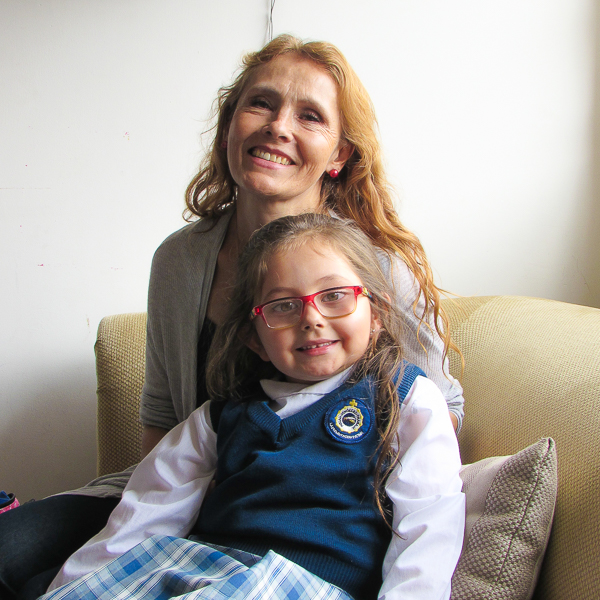
A child living in the worst affected zone suffers hearing loss.
The Harm to the People of Fontibón
The expansion has exacerbated already severe noise-related harm. IDB project documents identify noise pollution as a concern, but failed to require effective, modern, means of noise mitigation. Today, planes land on the runway adjacent to Fontibón up to 24 hours a day, and there is no reprieve from the noise.
Noise levels in the Fontibón neighborhood frequently exceed national noise limits. Noise insulation that Aerocivil is required to install in homes and community premises is incomplete, inadequate, and poorly maintained. Aerocivil has also violated restrictions imposed by the airport’s environmental license including restrictions on the directions and schedules of flight routes to and from each runway. Those restrictions were designed and imposed to mitigate the impacts of noise pollution on neighboring communities, especially during nighttime hours.
Neighboring communities are deeply concerned about the impacts of this excessive noise on their health and wellbeing. Bogotá’s Secretary of Health, health professionals, and academic institutions have all concluded that there is a relationship between the noise generated by the airport and damage to the health of the residents of Fontibón. Studies have found that at least one third of adult residents of Fontibón suffer from chronic insomnia, leading to symptoms such as frequent headaches, irritability, anxiety, and difficulty concentrating.
The noise has also caused hearing damage in children, impacting their development and academic progress, including children like Gabriela.
“When Gabriela was five years old and didn’t talk, it was found that she had 40 percent hearing loss in one of her ears and 20 percent in the other. This has caused problems in the development of her speech, affected her cognitive function and delayed her academic development. Since the moment that these problems were diagnosed, we have had to pay for specialized physicians, such as ENT specialists, speech therapists, psychologists, and for specialized therapies, in order to provide her with complete treatment. We initiated this process six years ago and it will continue in order to avoid major damage. … Until now, and with a big effort, we have been able to pay for the medical treatments. However we wonder about other families that could have the same situation with their children. If they don’t have the economic means to pay for the treatments, this will affect them for the rest of their lives.” — Julio Ramón Acosta Téllez, who lives in one of the Fontibón neighborhoods worst affected by aircraft noise

A woman lives in the zone worst affected by noise yet has no sound insulation in her walls or roof.
However, the IDB insisted that the severe noise-related harm was not the responsibility of it or its client, because the contract between OPAIN and Aerocivil provided that Aerocivil, not OPAIN, would be responsible for noise mitigation. This stance substantially undermined the IDB’s commitment to environmental and social responsibility.
We have closely partnered with Comunidades Unidas on accountability for IDB’s investment. For more information on the case to the IDB’s accountability office, the Independent Consultation and Investigation Mechanism (MICI), please visit our case page here.
We will continue to work with Comunidades Unidas to demand that the airport operators and their new investors resolve the issues identified by MICI and develop a long-term noise management plan that supports community health and well-being.
Case Partners
Comunidades Unidas Macroproyecto Aeropuerto El Dorado (Comunidades Unidas)
“MICI considers that Management’s argument that neither the Bank nor the Client is responsible for or has any influence on air activities and that the Bank is not involved in any activities on the Aerocivil side is an attempt to be relieved of responsibility and contradicts not only what the Project initially established but also the essence underlying any Bank financing, as reflected in the standards set in Bank policies, particularly Operational Policy OP-703. This policy is a tool that should be used to achieve social and environmental success in any IDB project. There is an express requirement to identify, assess, and manage both direct and indirect impacts and risks, and it is the Bank’s obligation to determine how to manage them, whether they are produced by the Bank’s client or by a third party.” — MICI Report
-
The Case
-
Jun 2017
MICI released its investigation report concluding that the IDB violated its environmental and social safeguards resulting in harm to local communities (available in English and Spanish).
The Executive Directors of the IDB adopted seven out of eight of MICI’s recommendations, but they unfortunately failed to adopt the recommendation most meaningful to the communities – that the bank work with relevant Colombian authorities to analyze ways to improve the sustainability of the airport – claiming that such action would be out of its hands.
-
Dec 2016
MICI concluded its investigation. It found that the IDB violated at least seven aspects of its environmental and social safeguards. Among its conclusions, MICI found:
- The IDB and its client, the company OPAIN, failed to recognize the scale and complexity of the noise risks. Fontibón has a population of more than 300,000 people and many of its residents live directly on the margins of the airport. The IDB and OPAIN failed to evaluate the impact that increased noise generated by the expanded airport would have on the residents there.
- The IDB and OPAIN failed to meaningfully consult communities before the project was approved and as it was implemented.
- The IDB and OPAIN failed to validate that appropriate systems and mitigation measures – including noise insulation – were in place to protect communities from the severe noise.
- Noise levels in the Fontibón neighborhood have frequently exceeded national legal noise limits. Yet the IDB had no system in place to monitor or respond to these violations, and therefore had no way to ensure that the project it was financing complied with national law.
- These failures are linked to the health and stress impacts that communities are suffering. Studies have found that at least a third of Fontibón residents suffer from chronic insomnia and that reports of hearing damage are higher in areas with greater exposure to the noise. Children are particularly vulnerable, with studies finding a relationship between long-term exposure to aircraft noise and developmental delays. Yet the IDB made no mention of health risks and impacts.
The same month, Comunidades Unidas conducted a survey of 80 families living within the zone worst affected by airport noise (in English and in Spanish). 93% of survey respondents confirmed that they do not have any form of noise insulation in their homes, while a further 2% have insulation in a single room only. More than 90% attributed a health concern – such as loss of hearing, insomnia, tinnitus, anxiety and elevated heart rate – to the airport noise.
-
Aug 2016
Comunidades Unidas sent a letter to MICI explaining potential recommendations that MICI could make as part of its compliance review (in Spanish only).
-
Apr 2016
Three Accountability Counsel team members traveled to Colombia to support Comunidades Unidas during a visit by MICI investigators. The investigators visited affected neighborhoods and met with affected community members, gathering information about the impacts of the airport’s expansion.
-
Mar 2016
Accountability Counsel produced a brochure (in Spanish only) explaining the case and the parties involved to assist communities to prepare for a site visit by MICI investigators.
-
Dec 2015
-
Nov 2015
Comunidades Unidas provided comments on MICI’s draft recommendation and terms of reference for the Compliance Review Phase (submitted in Spanish, English translation available at Annex II of the Terms of Reference).
-
Nov 2014
-
Sep 2014
Accountability Counsel assisted Comunidades Unidas to submit a supplemental filing to MICI regarding the noise pollution in the Fontibón locality in Bogotá, Colombia for the Compliance Review Phase (in Spanish only). The supplement analyzes violations of the IDB’s safeguards policies and argues that the bank shares responsibility for the noise-related harm.
Specifically, it argued that the IDB’s failure to ensure that the severe noise impacts were effectively mitigated gave rise to the following violations of the IDB Environment and Safeguards Compliance Policy (OP-703):
- The IDB failed to ensure that the project effectively avoided, mitigated or compensated the risks of noise-related harm
- The IDB failed to properly recognize Aerocivil as a necessary third party for the effective mitigation of environmental and social impacts and analyze the risks associated with Aerocivil’s role in the project
- The IDB failed to develop a management plan in consultation with affected communities prior to project approval
- The project failed to comply with Colombia’s environmental laws and other relevant national laws
- The IDB failed to conduct appropriate due diligence regarding noise mitigation and the project’s impacts on noise pollution
The supplemental filing urged MICI to investigate the IDB’s role in and responsibility for the severe noise-related harm caused by the expansion and modernization of the El Dorado airport.
-
Jul 2014
-
May 2014
As part of the consultation phase, MICI commissioned an independent expert report analyzing the management of noise at the report. The report found that the airport was failing to comply with a number of industry best practices.
-
Jan 2013
The Secretary of Health for Bogotá reported that 67% of Fontibón’s population sleeps poorly, up to 37% suffers chronic insomnia, and children exposed to high levels of noise are experiencing early hearing loss that can hinder their development (in Spanish only).
-
Mar 2012
-
Jan 2012
The Secretary of Health for Bogotá published a study of the effectiveness of the noise insulation in the Fontibón locality, which found that only 2.7% of study participants had partial sound insulation in their homes and only 1.1% felt protected from the noise (in Spanish only).
-
Nov 2011
-
Aug 2011
Comunidades Unidas filed an initial complaint to MICI (in English only) about the harmful impacts of the expansion of the airport on the neighboring Fontibón community.
The complaint was found eligible for the consultation phase, and MICI convened a dialogue between Comunidades Unidas, two other neighborhood organizations, Aerocivil, and OPAIN. After several years of making progress, the dialogue broke down, in large part over disputes regarding OPAIN’s (and the IDB’s) responsibility for the noise mitigation. MICI then made the decision to close the Consultation Phase and transferred the case to the Compliance Review Phase.
At that point, Comunidades Unidas turned to Accountability Counsel for assistance.
-
-
Impact
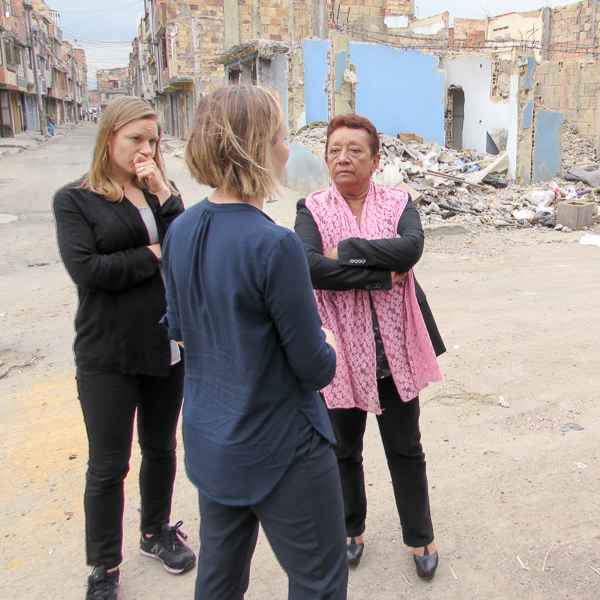
Accountability Counsel attorneys meet with affected community members in Bogota
Comunidades Unidas turned to Accountability Counsel for assistance after a facilitated dialogue process failed to resolve noise issues caused by the El Dorado Airport expansion project.
In September 2014, Accountability Counsel began closely supporting Comunidades to further document the harm and translate the problems from the airport expansion into the language of the violations of IDB policies. Our legal team assisted communities in filing a supplemental document to the IDB’s accountability office, called MICI, analyzing violations of the IDB’s safeguards policies and arguing that the Bank bears responsibility for the severe noise-related harm.
The impact of that Accountability Counsel support was that the complaint was found eligible for the Compliance Review Phase and the Board approved MICI’s recommendation to conduct an investigation of the role of the bank in any harm caused by expansion of the airport.
Accountability Counsel’s attorneys then supported Comunidades Unidas throughout that investigation. Our attorneys produced a Spanish-language brochure explaining the case and the parties involved to assist communities to prepare for a site visit by MICI investigators. In early April 2016, three Accountability Counsel team members traveled to Colombia to accompany Comunidades Unidas during the visit by MICI investigators, assisting to ensure that the investigators heard from directly affected residents and were able to observe and hear the harm.
When MICI concluded its investigation, it confirmed that the IDB violated at least seven different aspects of its environmental and social obligations, causing harm to communities. The report reads like a laundry list of failures to recognize the human cost of the expanded airport. Community members feel vindicated by the compliance report’s conclusions.
However, despite the strength of these findings, the IDB does not plan to take any meaningful steps towards fixing the problems in Bogotá. The loan taken by OPAIN was repaid early and there is no longer a contractual relationship between the IDB and the company. The IDB’s Board of Directors failed to adopt MICI’s explicit recommendation that the IDB work with relevant Colombian authorities to analyze ways to improve the sustainability of the airport, claiming that such action is out of the Bank’s hands.
Accordingly, our work continues. Accountability Counsel is supporting Comunidades Unidas to engage with new investors in the project, calling on those investors to learn from the IDB’s mistakes and put in place a long-term noise management plan that protects community health and wellbeing in addition to economic interests.
-
Case Media
Videos
Media Coverage
- 14 July 2015 Rugido de motores By Gonzalo Silva Rivas, El Espectador
- 15 April 2015 La pesadilla de habitantes de Fontibón por el ruido de aviones By Redacción Bogotá, El Espectador
- 18 November 2012 Los líos de la nueva terminal en Bogotá By Santiago Valenzuela, El Espectador
Op-Eds
- 29 September 2017 Deafening noise from flights over Fontibón in Bogotá, Colombia. Something went wrong with the IDB By Lani Inverarity, Accountability Counsel, in openDemocracy
Blog Posts
- 5 October 2018 In their own voice: why access to information matters to communities
- 8 March 2017 New Video: This Is Why We Support Comunidades Unidas (And Why You Should Too)
- 20 December 2016 Training the Trainers: Comunidades Unidas Presents at Mechanism-CSO Workshop in Colombia
- 6 December 2016 Going Forward Together: Lessons from Mongolia and Colombia on the Importance of Fair Benefit-Sharing For Sustainable Development
- 8 August 2016 Meet Gabriela Acosta
- 13 July 2016 The Human Cost of Airports
- 8 April 2016 Supporting Colombian Communities re Harmful Airport Expansion Financed by the Inter-American Development Bank
- 10 December 2015 Investigation in IDB-funded Colombia Case Will Move Forward
Press Releases
Photos
-
 Gloria Molina, spokesperson for Comunidades Unidas, shares information about the MICI report
Gloria Molina, spokesperson for Comunidades Unidas, shares information about the MICI report -
 A child living in the worst affected zone suffers hearing loss
A child living in the worst affected zone suffers hearing loss -
 Gabriela Acosta suffers significant hearing loss, affecting her academic development
Gabriela Acosta suffers significant hearing loss, affecting her academic development -
 Residents of Fontibón seek modern, effective noise insulation to protect their families
Residents of Fontibón seek modern, effective noise insulation to protect their families -
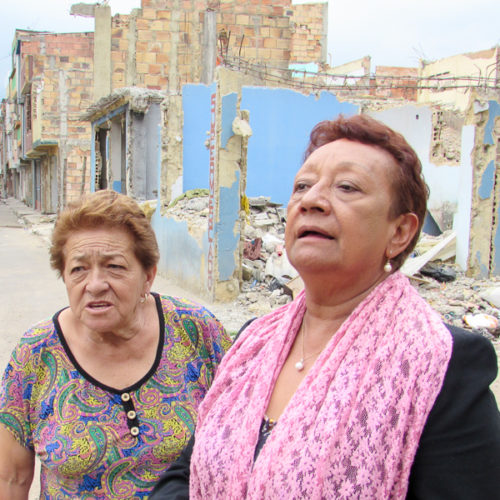 Community members living next to the airport have struggled for years to have their voices heard
Community members living next to the airport have struggled for years to have their voices heard -
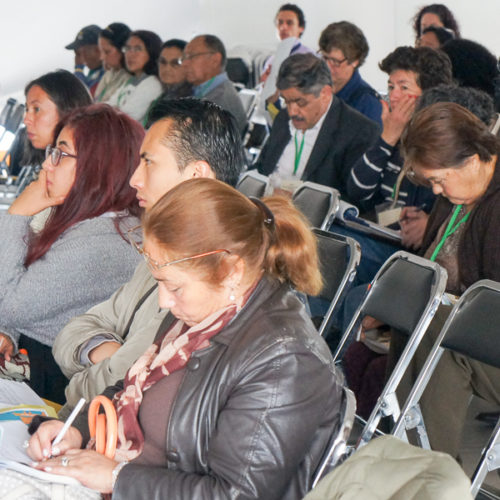 Community members gather to hear about the MICI report
Community members gather to hear about the MICI report -
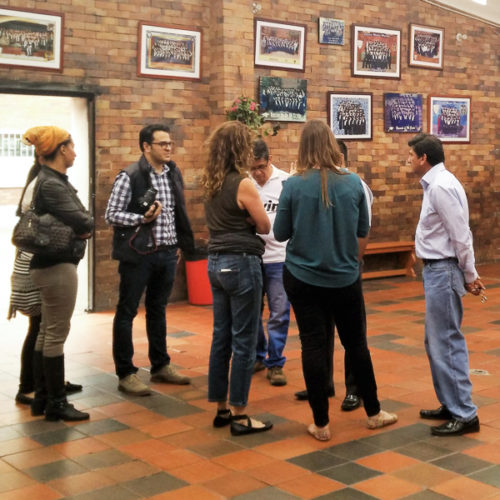 Teachers speak to MICI about the impacts of the noise on children and their academic development
Teachers speak to MICI about the impacts of the noise on children and their academic development -
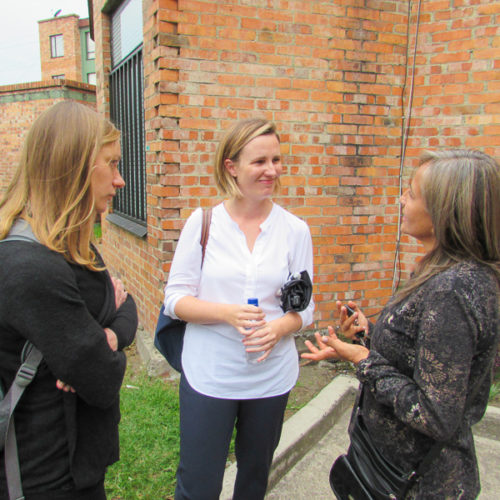 Accountability Counsel attorneys with Gloria Molina, spokesperson for Comunidades Unidas
Accountability Counsel attorneys with Gloria Molina, spokesperson for Comunidades Unidas -
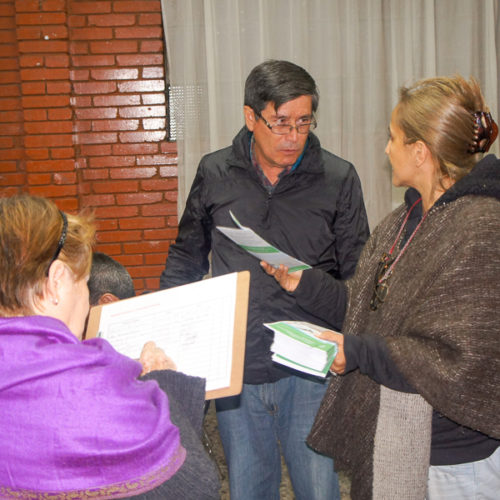 Gloria Molina, Director of Comunidades Unidas, distributes information in a community meeting
Gloria Molina, Director of Comunidades Unidas, distributes information in a community meeting -
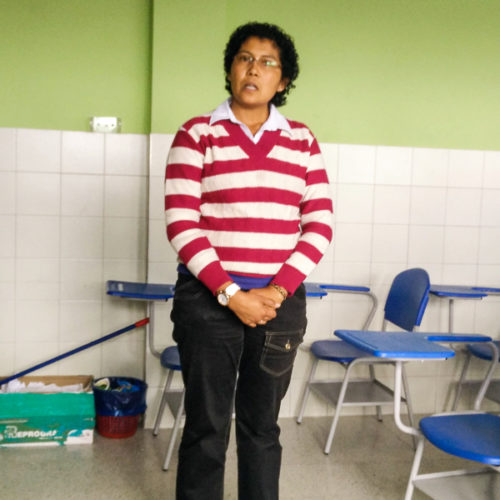 A teacher describes the disruption caused by airport noise
A teacher describes the disruption caused by airport noise -
 A woman lives in the zone worst affected by noise yet has no sound insulation in her walls or roof
A woman lives in the zone worst affected by noise yet has no sound insulation in her walls or roof -
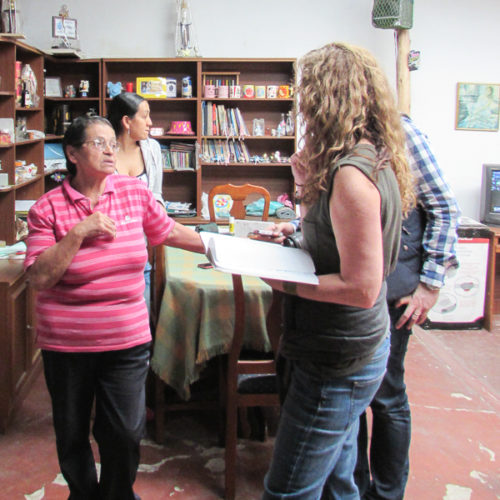 Affected community members speak with MICI
Affected community members speak with MICI -
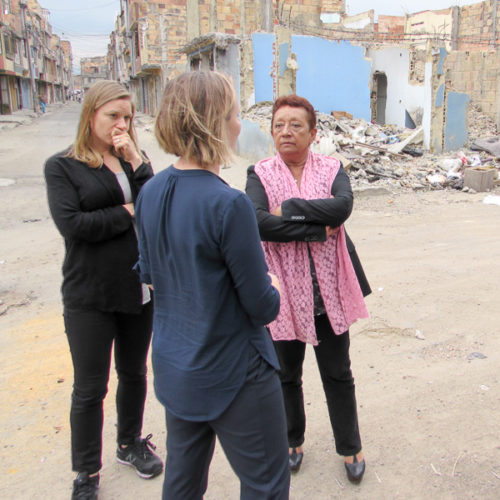 Accountability Counsel attorneys meet with affected community members in Bogotá
Accountability Counsel attorneys meet with affected community members in Bogotá -
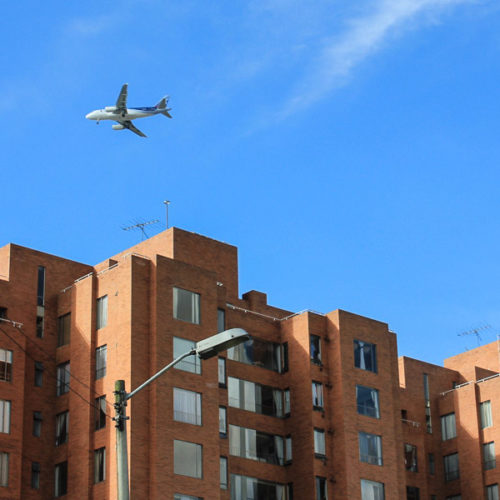 Every few minutes planes land and take off overhead
Every few minutes planes land and take off overhead -
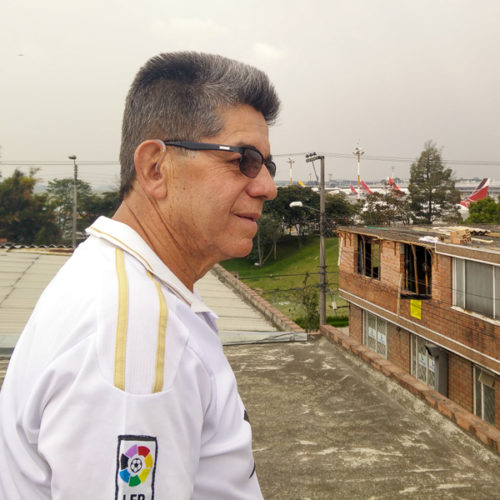 A Fontibón resident, who suffers hearing loss, can see the planes just meters from his roof
A Fontibón resident, who suffers hearing loss, can see the planes just meters from his roof -
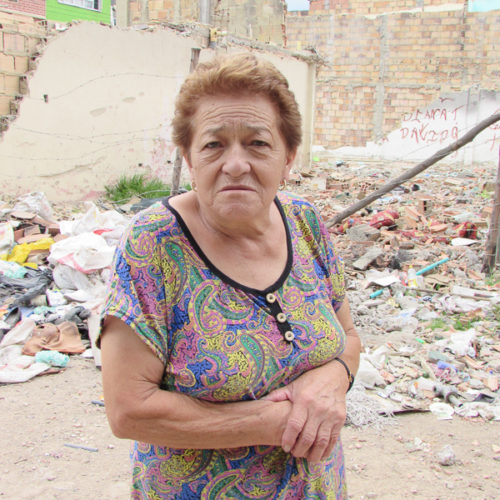 A community member stands in front of a street destroyed due to the airport development
A community member stands in front of a street destroyed due to the airport development -
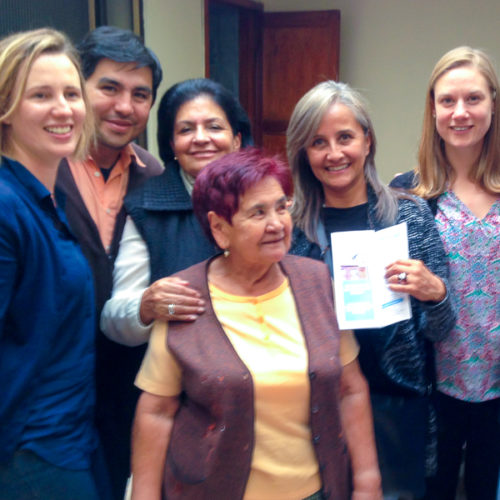 Accountability Counsel attorneys with community representatives in Bogotá
Accountability Counsel attorneys with community representatives in Bogotá -
 Planes fly low over buildings on arrival at El Dorado Airport
Planes fly low over buildings on arrival at El Dorado Airport -
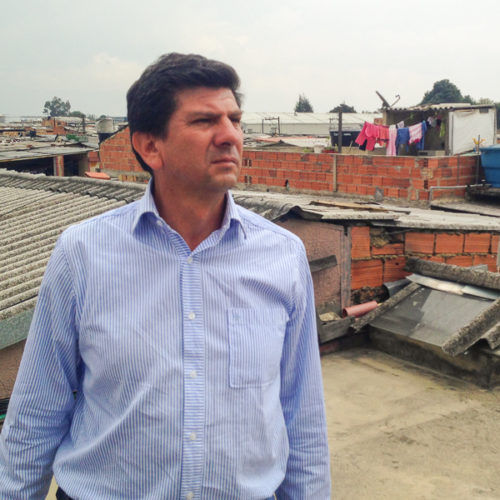 The daughter of Julio Acosta Téllez suffers significant hearing loss, affecting her development
The daughter of Julio Acosta Téllez suffers significant hearing loss, affecting her development


